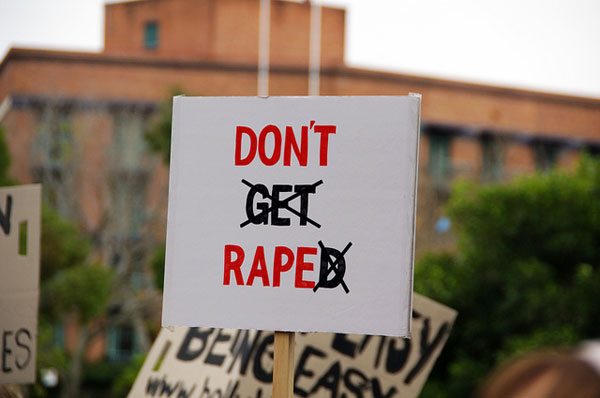
November 28, 2017; CBS New York
Between January 2015 and February 2017, 86 people showed up at the Brooklyn Hospital Center after suffering a sexual assault to receive a forensic examination they hoped might help catch their attackers. For 85 of those 86 people, the trauma of the attack and examination was followed by the insult and inconvenience of a hospital bill.
The matter came to the attention of New York Attorney General Eric Schneiderman because one woman contacted his office after she was “billed seven different times for her rape kit, hundreds of dollars each time” and then had her bill sent to a collections agency.
This week, Schneiderman announced a settlement with the hospital, in which “Brooklyn Hospital will maintain a Sexual Assault Victim Policy that prevents such improper billing and will provide full restitution to improperly billed sexual assault survivors,” in addition to paying a $15,000 fine to the New York State Department of Law.
“These kits are used on what is undoubtedly one of the worst days of a survivor’s life,” Schneiderman told NBC New York. “The absolute last thing they should have to worry about is how they’ll pay for their care at the hospital.”
That’s one case wrapped up, perhaps, but how on earth did this happen? Is there any scenario in which a billing department looks at a report of sexual assault and thinks the victim should be financially liable for the aftermath?
Apparently, there are, and quite a few of them. Reuters reported earlier this year that 88 percent of the 1,355 women who reported being sexually assaulted in 2013 were sent a bill, with an average charge of about $950. (The study Reuters used did not include male or LGBTQ victims.) New York is actually one of the more progressive states in this respect; according to the Attorney General’s office, “New York State Executive Law Section 631(13) provides that when a hospital furnishes services—including a forensic rape examination (FRE)—to any sexual assault survivor, it shall provide such services to the patient without charge and shall bill the Office of Victim Services (OVS) directly, or alternatively, the sexual assault survivor may voluntarily opt to assign the costs to private insurance [for privacy reasons].”
Sign up for our free newsletters
Subscribe to NPQ's newsletters to have our top stories delivered directly to your inbox.
By signing up, you agree to our privacy policy and terms of use, and to receive messages from NPQ and our partners.
Scott Berkowitz, president and founder of the Rape, Abuse and Incest National Network (RAINN), told Reuters, “Congressional attention has been focused on making sure victims aren’t charged for the rape kit and forensic evidence, and there hasn’t been as much attention paid to making sure they aren’t charged for the other medical costs that result.”
The Violence Against Women Act makes it illegal for victims to be billed for the forensic examination and collection of evidence, but many states don’t legally protect victims from being billed for medical expenses related to sexual assault. A 2014 Urban Institute report showed that in a number of states, victims’ medical bills are paid only if they agree to report the attack and cooperate with law enforcement, and definitions of cooperation can vary from state to state.
A 2012 report from Æquitas shows just how complicated it is when each state has its own guidelines for what is and isn’t covered by victim compensation funds.
Thirteen states cover the cost of a pregnancy test, and six of those states provide payment for emergency contraception. Fifteen states will pay for tests for sexually transmitted infections (STI). Fifteen states cover costs of medications prescribed following the forensic examination. Ten states will pay hospital and emergency room fees. Two states, Indiana and Vermont, will pay for the victim’s counseling related to the sexual assault. Five states will pay for treatment of injuries related to the sexual assault. Four states provide payment for reasonable medical care related to the sexual assault. Three states will pay for toxicology and drug testing.
Some states have updated their laws and coverage since that report, but the fact remains that in most states, sexual assault victims are more likely than not to get a bill for medical care, which means that in the event of an assault, taking care of their health may result in a bill they may not be able to pay.
In states where medical expenses are covered, the money often comes via crime victim compensation funds, which are administered by the state and funded through the collection of fees. This is seen as the most efficient and reliable way to handle the billing, since these agencies already deal with the intersection of police and health regulations. However, as the Urban Institute rightly points out, “No other evidence collection activities (such as autopsies, crime scene processing, and ballistics analysis) are paid for with funds meant for services to victims.” It would be unthinkable to charge a robbery victim for crime scene photographs, or a fraud victim for the time on the phone with investigators. Why is this type of crime any different?
NPQ has previously highlighted where the prosecution of rape and sexual assault seems to rank low among law enforcement priorities, as shown, for example, by the inexcusably large backlog of untested rape kits gathering dust in evidence warehouses all over the country. Burdening victims with the financial costs of sexual assault in addition to the physical and emotional trauma is reprehensible and must be stopped. We hope that states will see this situation for what it is and protect future victims from this additional burden.—Erin Rubin













